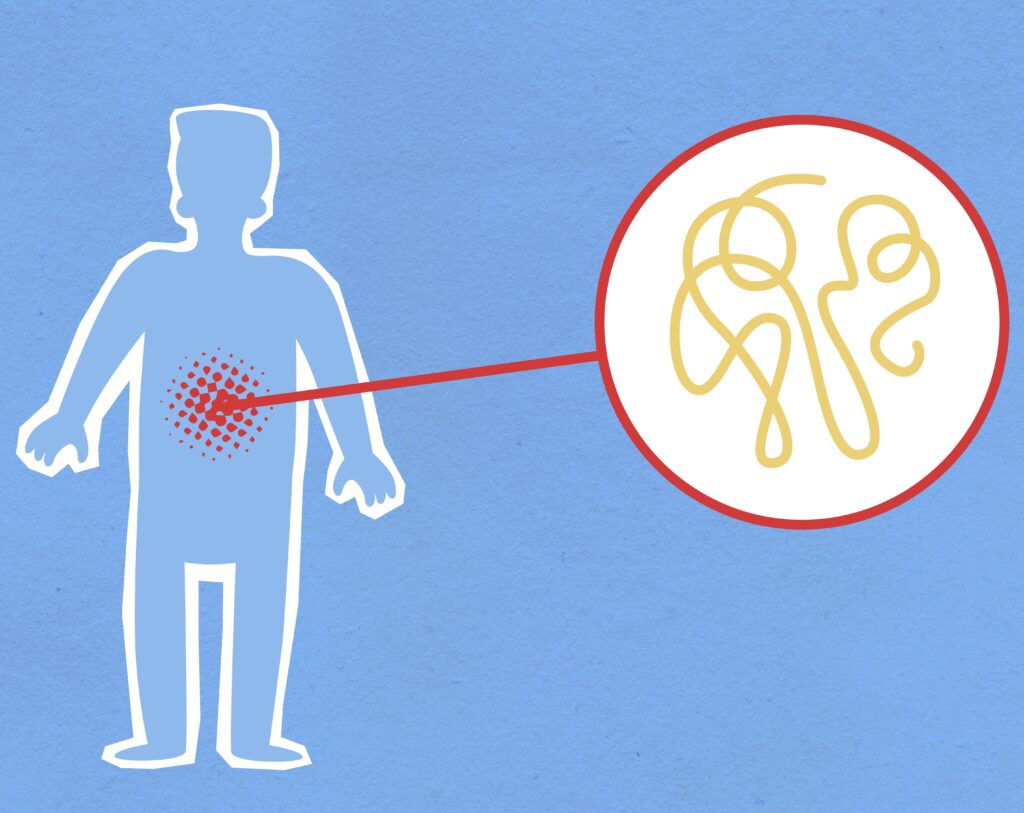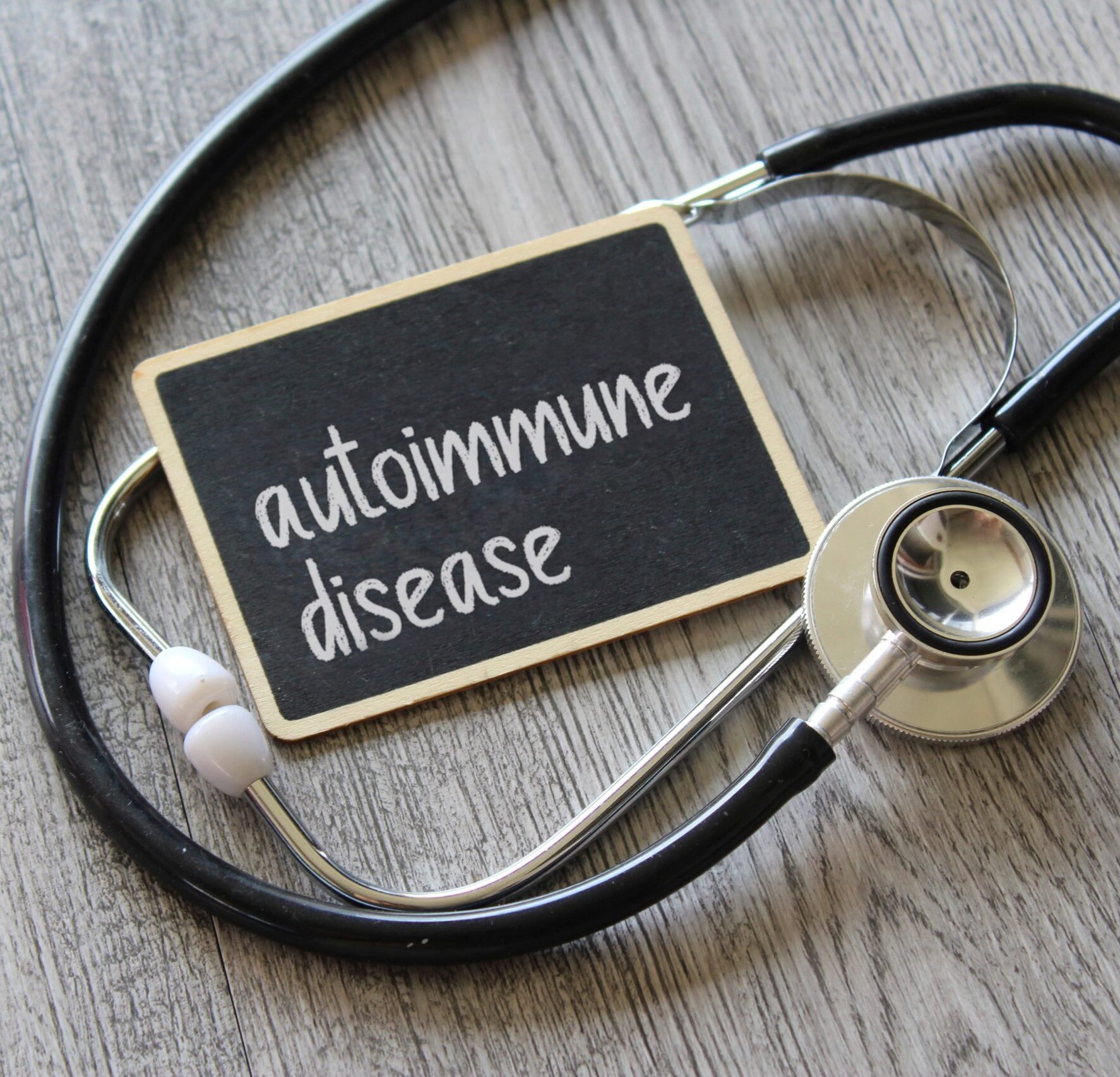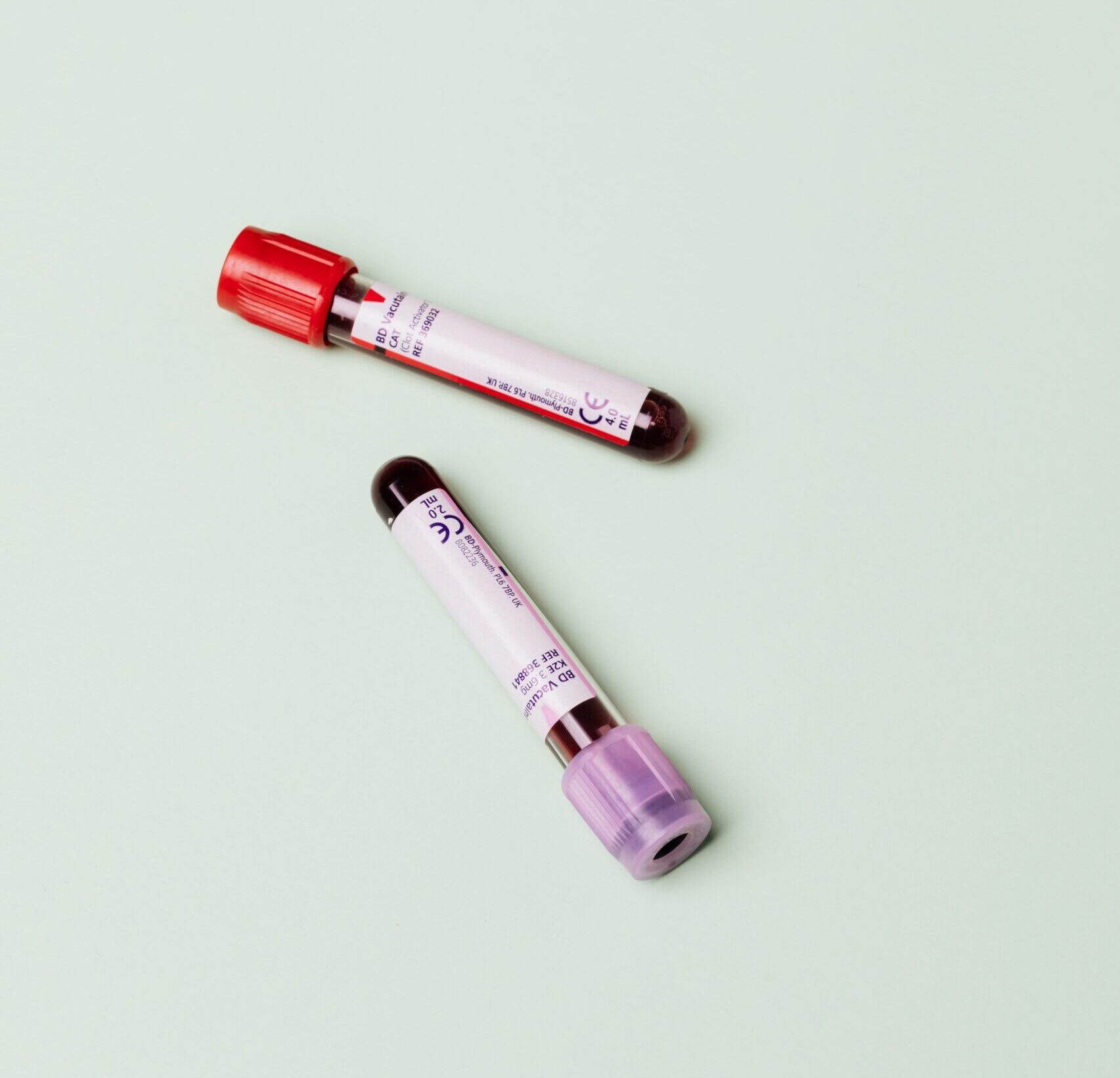Crohn’s Disease
1.3% of American adults have an inflammatory bowel disease. That may not sound like a high rate. However, that equates to over 3 million people and does not account for children with these disorders.
Crohn’s disease falls into the inflammatory bowel disease category. It primarily affects the digestive tract, though people with the disorder may also experience symptoms in other parts of the body.
Are you searching for more information about Crohn’s disease? You’ve come to the right place.

How We Help
Are you tired of trying to get your Crohn’s symptoms under control? If so, Revolution Gut Health can help. Schedule a gut health consultation to learn how we might be able to put you on a path to relief from Crohn’s Disease symptoms.
Disclaimer: The health information on this site is provided for general informational and education purposes only and is not a substitute for professional advice. Accordingly, before taking any actions based upon such information, we encourage you to consult with the appropriate professionals. The use or reliance of any information contained on this site is solely at your own discretion. Revolution Gut Health does not claim to heal, treat or cure any of the conditions mentioned.
What Is Crohn’s Disease?
Crohn’s disease is an autoimmune disorder and a type of inflammatory bowel disease (IBD).
Autoimmune disorders occur when the body mistakenly attacks and destroys healthy tissue instead of foreign invaders. There are dozens of autoimmune disorders, including Celiac disease and multiple sclerosis (MS).
IBDs are also a type of autoimmune disorder. It leads the immune system to attack healthy digestive system tissues, resulting in chronic inflammation. Ulcerative colitis and Crohn’s disease are the most common IBDs.

Crohn’s Disease Symptoms
The hallmark symptom of Crohn’s disease is inflammation. Inflammation is an immune system response, which, in this case, may show up like:
- Diarrhea
- Fever
- Fatigue
- Abdominal cramps
- Stomach pain
- Bloody stools
- Sores in the mouth
- Anal drainage
- Unintended weight loss
With Crohn’s disease, inflammation occurs within the digestive tract, most commonly in the small intestine. However, the exact part of the digestive tract affected varies by individual.
Further, some people may develop symptoms that do not directly affect the digestive tract. These include swollen eyes, joints, or skin. Kidney stones, anemia, and liver or bile duct inflammation may also indicate Crohn’s disease.
Symptoms may range from mild to severe. A medical professional should always treat severe symptoms, though individuals should also schedule a doctor’s visit if they experience even mild symptoms of Crohn’s disease.
Finally, this IBD can affect mental health. People with conditions like Crohn’s are two to three times more likely to experience anxiety and depression due to their disorder.
Have A Question?
Contact our team for a FREE discovery call.
Crohn’s Disease Risk Factors
There is a common misconception that high-stress levels cause Crohn’s. Yet, the causes of this disease are far more complex and multilayered.
So far, research has revealed that genetic and environmental factors both play a role. Certain factors may increase the risk of having this disorder. These risk factors include but are not limited to:
Age: Younger people are more likely to receive a diagnosis than older adults
Ethnicity: People of European descent are more likely to have Crohn’s
Smoking: People who smoke are at a higher risk for Crohn’s than non-smokers
Genetics: People with family members who have Crohn’s are more likely to have it too
The only preventable risk factor on this list is smoking. Quitting tobacco products not only reduces the risk of Crohn’s. It may also prevent chronic conditions and other health problems for which smoking is a risk factor.
Unfortunately, doctors and researchers have not discovered a cure for this disorder. However, certain treatments can help.
Treatment for Crohn’s Disease
The first step to getting treatment for Crohn’s disease is diagnosis. Doctors have yet to come up with a conclusive test for this IBD. Instead, healthcare providers typically perform tests to rule out other potential symptom causes.
Once patients undergo these lab tests, which often include a blood and stool sample, their doctor may order other tests. These tests may include a colonoscopy, imaging work, an endoscopy, or an enteroscopy.
Treatment is possible once doctors determine that Crohn’s disease causes the patient’s symptoms. Treatment aims to reduce inflammation, alleviate symptoms, and limit potential complications (more on these in a moment).

Crohn's Disease Medical Procedure
Medicines prescribed for Crohn’s disease meet the first goal of treatment for this disorder: to reduce inflammation. Drugs that can help reduce inflammation in people with this condition include:
- Anti-inflammatory drugs: To reduce digestive tract inflammation directly
- Immune system suppressant drugs: To reduce inflammation-causing substances in the immune system
- Immune system biologics: To reduce inflammation-related proteins in the immune system
Other medications some people may receive for the treatment of Crohn’s include antibiotics, antidiarrheals, and over-the-counter pain relievers.
If these medications are ineffective, a doctor may prescribe surgery to remove the dysfunctional part of the digestive tract. In fact, 50% of people diagnosed with this disease have to undergo at least one surgical procedure.
Symptoms may still recur after surgery. For that reason, many medical professionals focus on lifestyle changes. For example, dietary additions and restrictions can help prevent symptoms from re-emerging after treatment.
Crohn's Disease Self-Care
Living with Crohn’s Disease can be stressful, which exacerbates symptoms. Stress management techniques can be an integral part of a holistic Crohn’s disease management strategy. Meditation, yoga, and deep-breathing exercises can help reduce stress and enhance their pain tolerance. Cognitive behavioral therapy can also be beneficial for managing the psychological stress associated with chronic illness.
Regular physical activity may aid in the management of Crohn’s Disease. Physical activity boosts the immune system, reduces stress, and promotes a healthy weight. It is essential to tailor the intensity and type of exercise to an individual’s capabilities, particularly during an acute episode.
Obtaining sufficient sleep is essential. Insomnia can cause inflammation and exacerbate symptoms, so establish a regular sleep schedule. A holistic approach is valuable in the management of chronic conditions such as Crohn’s disease. Dietary modifications, stress management, and lifestyle modifications can all contribute to an improvement in life quality.
Crohn's Disease Diet
Recognizing the influence of diet on overall health is crucial. Certain foods may exacerbate symptoms, while others may alleviate them.
Dietary responses to Crohn’s disease can be highly individualized, so it’s essential to collaborate with a healthcare provider to develop a personalized plan. Crohn’s Disease patients are frequently advised to consume an anti-inflammatory diet rich in anti-inflammatory omega-3 fatty acids, such as fish, flaxseeds, and walnuts. Although fruits and vegetables are excellent sources of antioxidants and fiber, raw food has the potential to irritate the gut lining.
Avoid highly-processed foods, those high in sugar and unhealthy fats, alcohol and caffeine.
Supplements for Crohn's Disease
As mentioned, unintended weight loss is often a symptom of Crohn’s disease. It may occur if the digestive system fails to process food properly. Consequently, the body can’t absorb enough nutrients to thrive.
For this reason, many doctors prescribe nutritional supplements for people with IBDs. First, the patient must undergo a blood panel to identify deficiencies. The doctor can then prescribe supplements based on the results.
Some of the most common supplements used to support this IBD are omega-3 fatty acids, calcium, and folic acid. Iron, zinc, and vitamins A, B12, D, E, and K may also be beneficial.
Additionally, some doctors may prescribe certain diets to optimize digestion. A low-fiber diet is a common recommendation. Foods lower in fiber can reduce stress on the digestive tract and prevent intestinal blockage.
Probiotics for Crohn's Disease
Scientists used to suspect that gut bacteria must play a role in Crohn’s disease development. Today, there is plenty of scientific evidence backing this theory. However, adding new bacterial species to the gut microbiome may not be sufficient to reverse this condition.
This is known because of research on the benefits of probiotics for Crohn’s disease symptoms. So far, studies have shown no link between probiotics and acute or long-term improvement, but more research is needed to know for sure.
Complications of Leaving Crohn’s Disease Untreated
Regardless of its effectiveness, treatment is essential for people with IBDs. If left untreated, Crohn’s disease may lead to the following serious complications:
- Obstructed bowels
- Digestive tract ulcers
- Intestinal fistulas
- Anal fissures
- Malnourishment
- Colon cancer
- Blood clots
It is even more crucial for children at risk for or diagnosed with Crohn’s disease to get help for their condition.

Crohn’s Disease in Children
Crohn’s disease in children can impact development when left untreated. Specifically, symptoms like malnourishment and severe diarrhea can delay growth.
To avoid this complication, parents of children who are at risk of Crohn’s disease should learn more about this condition.
What Is Crohn's Disease in Children?
Crohn’s disease in children features inflammation of the digestive tract. The condition affects children virtually identically to how the disorder progresses in adults. The difference is the different complications that can arise.
Unfortunately, Crohn’s is a chronic condition that occurs in adults and children with no known one-size fits all solutions, and though symptoms may dissipate at times, flare-ups may occur for the rest of the child’s life.
What Causes Crohn's Disease in Children?
Experts are not sure exactly what causes Crohn’s disease in children, but the most likely culprits are early viral or bacterial infections or congenital disabilities.
In the first case, the child may develop a viral or bacterial infection. Subsequently, the immune system may respond abnormally, leading to chronic digestive tract inflammation.
The second potential cause is murkier.
Scientists are not sure whether immune system abnormalities lead to Crohn’s or if it is the other way around. More research is needed to determine the link between abnormal immunity and IBDs.
Which Children Are at Risk for Crohn's Disease?
Children are at risk for Crohn’s disease if they have a family history of the disorder or fall into other high-risk groups. These high-risk groups include the following:
- People of European descent, including Jewish people of European descent
- People who live in developed countries
- People who live in northern cities with colder climates
Smoking is also a risk factor for Crohn’s disease in children. Fortunately, very few young children smoke. Parents should educate their teenagers about the risks of smoking, especially if their teen is in one of these high-risk groups.
What Are the Symptoms of Crohn's Disease in Children?
The symptoms of Crohn’s disease in children include inflammation, swelling, and sores in the digestive tract. Other signs parents should look out for if they believe their child has an IBD include but are not limited to:
- Stomach pain, particularly on the lower right side
- Diarrhea
- Bloody stool
- Rectal bleeding (with or without blood in their stool)
- Weight loss
- Fever
- Joint pain
- Anal fissures
- Rashes
- Delayed growth
As in adults, symptoms vary from one child to the next. Some children may have Crohn’s disease but be asymptomatic until they age. In the meantime, watching out for these signs and mitigating risk factors is crucial.
Alcohol and Crohn’s Disease
A commonly asked question about managing the symptoms of this IBD is, ‘Can I drink alcohol if I have Crohn’s?’ The answer is: it depends. Alcohol may worsen symptoms in some people, though not all.
With a doctor’s help, people can test their reaction to different types of alcohol. For people who do not experience worsening symptoms after having a drink or two, it may be safe to consume alcohol.
Individuals with Crohn’s disease who experience adverse reactions to alcohol should quit. Of course, this may be easier said than done. Getting treatment for alcoholism can help people who struggle to stop drinking with Crohn’s.


Crohn’s Disease and Pregnancy
There are many ways Crohn’s disease can affect pregnancy and vice versa. Here are some of the most important things to know about IBD and pregnancy:
- Pregnancy naturally suppresses the immune system, which may reduce Crohn’s disease symptoms.
- Pregnancy increases the production of relaxin, a hormone that may inhibit certain inflammatory responses, such as scar tissue formation.
- Crohn’s may increase the risk of miscarriage, premature delivery, or stillbirth in pregnant people.
Something else to note is the potential impact of Crohn’s medication on pregnancy. While the risk is low, individuals worried about whether they can use their medication while pregnant should talk to a doctor.
Crohn’s Statistics
Life Expectancy for Crohn's Disease
The average lifespan of someone with Crohn’s disease depends on their gender. For women, the average life expectancy is around 78 years. For men, it is slightly lower at 75.5 years.
Though not a significant difference, these life expectancy figures are lower than the average US adult’s lifespan. According to the latest statistics, the average American lives to be at least 76.1 years old.
Crohn's Disease Death Rate
In a study of 6,000 British people with Crohn’s disease, researchers found a 73% higher death rate compared to individuals who do not have this IBD. Other studies have come to different conclusions.
Overall, the death rate for people with Crohn’s may range from 43% to 143%. More research is needed to uncover the truth about death rates among people with Crohn’s disease.
Crohn's Disease Remission
Let’s end things on a positive note and discuss remission. Remission happens when someone with a previous Crohn’s diagnosis no longer experiences symptoms or flare-ups of their disorder.
It is estimated that around 50% of people with Crohn’s disease enter remission after five years of continuous treatment. Even when these individuals do not eliminate all the symptoms, they may experience milder symptoms.
Unlock a healthier you today!
Take the first step towards a happier, healthier life with our FREE discovery call.